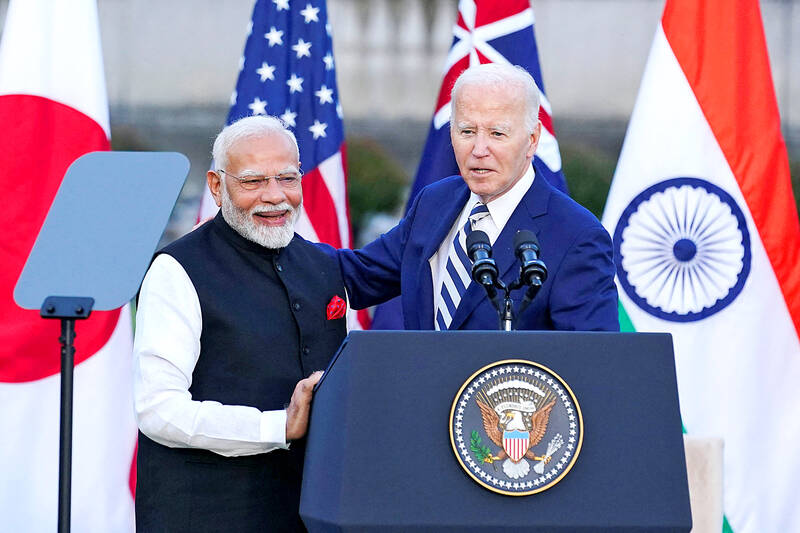The US and India reached an agreement to work together on setting up a semiconductor fabrication plant in the South Asian nation, giving a boost to Indian Prime Minister Narendra Modi’s efforts to bolster manufacturing in the country.
The proposed plant would make infrared, gallium nitride and silicon carbide semiconductors, according to a White House readout that followed a meeting between US President Joe Biden and Modi in Delaware on Saturday.
The setting up of the facility would be enabled by support from the India Semiconductor Mission and a “strategic technology partnership between Bharat Semi, 3rdiTech Inc and the US Space Force,” the readout said.

Photo: Reuters
India’s strategic geopolitical position in Asia has provided a fresh spotlight on the country and the opportunities it can afford in the field of technology.
Modi in the past decade has repeatedly said he would position India as an alternative to China, and it has already begun to pull away some of its manufacturing from Apple Inc and Samsung Electronics Co.
India is attempting to develop the entire chip value chain, Indian Minister of Railways, Information and Broadcasting, Electronics and Information Technology Ashwini Vaishnaw said earlier this month.
It aims to increase its electronics sector to US$500 billion by the end of the decade.
The countries also announced efforts to fund projects “catalyzing India’s domestic clean energy supply chain build out” for about US$1 billion through the International Bank for Reconstruction and Development.
Modi is visiting the US for the annual Quad Leaders’ Summit and in the three-day trip, he is holding bilateral meetings with its leaders, addressing the UN General Assembly and meeting with the Indian diaspora and US technology industry executives.
Modi on Sunday met with Alphabet Inc’s Google CEO Sundar Pichai, Nvidia Corp CEO Jensen Huang (黃仁勳), and Eli Lilly and Co CEO David Ricks among others. He also addressed an Indian diaspora event in Long Island, New York.
The next Quad meeting is scheduled to be held in India next year.

In Italy’s storied gold-making hubs, jewelers are reworking their designs to trim gold content as they race to blunt the effect of record prices and appeal to shoppers watching their budgets. Gold prices hit a record high on Thursday, surging near US$5,600 an ounce, more than double a year ago as geopolitical concerns and jitters over trade pushed investors toward the safe-haven asset. The rally is putting undue pressure on small artisans as they face mounting demands from customers, including international brands, to produce cheaper items, from signature pieces to wedding rings, according to interviews with four independent jewelers in Italy’s main

Japanese Prime Minister Sanae Takaichi has talked up the benefits of a weaker yen in a campaign speech, adopting a tone at odds with her finance ministry, which has refused to rule out any options to counter excessive foreign exchange volatility. Takaichi later softened her stance, saying she did not have a preference for the yen’s direction. “People say the weak yen is bad right now, but for export industries, it’s a major opportunity,” Takaichi said on Saturday at a rally for Liberal Democratic Party candidate Daishiro Yamagiwa in Kanagawa Prefecture ahead of a snap election on Sunday. “Whether it’s selling food or

CONCERNS: Tech companies investing in AI businesses that purchase their products have raised questions among investors that they are artificially propping up demand Nvidia Corp chief executive officer Jensen Huang (黃仁勳) on Saturday said that the company would be participating in OpenAI’s latest funding round, describing it as potentially “the largest investment we’ve ever made.” “We will invest a great deal of money,” Huang told reporters while visiting Taipei. “I believe in OpenAI. The work that they do is incredible. They’re one of the most consequential companies of our time.” Huang did not say exactly how much Nvidia might contribute, but described the investment as “huge.” “Let Sam announce how much he’s going to raise — it’s for him to decide,” Huang said, referring to OpenAI

The global server market is expected to grow 12.8 percent annually this year, with artificial intelligence (AI) servers projected to account for 16.5 percent, driven by continued investment in AI infrastructure by major cloud service providers (CSPs), market researcher TrendForce Corp (集邦科技) said yesterday. Global AI server shipments this year are expected to increase 28 percent year-on-year to more than 2.7 million units, driven by sustained demand from CSPs and government sovereign cloud projects, TrendForce analyst Frank Kung (龔明德) told the Taipei Times. Demand for GPU-based AI servers, including Nvidia Corp’s GB and Vera Rubin rack systems, is expected to remain high,